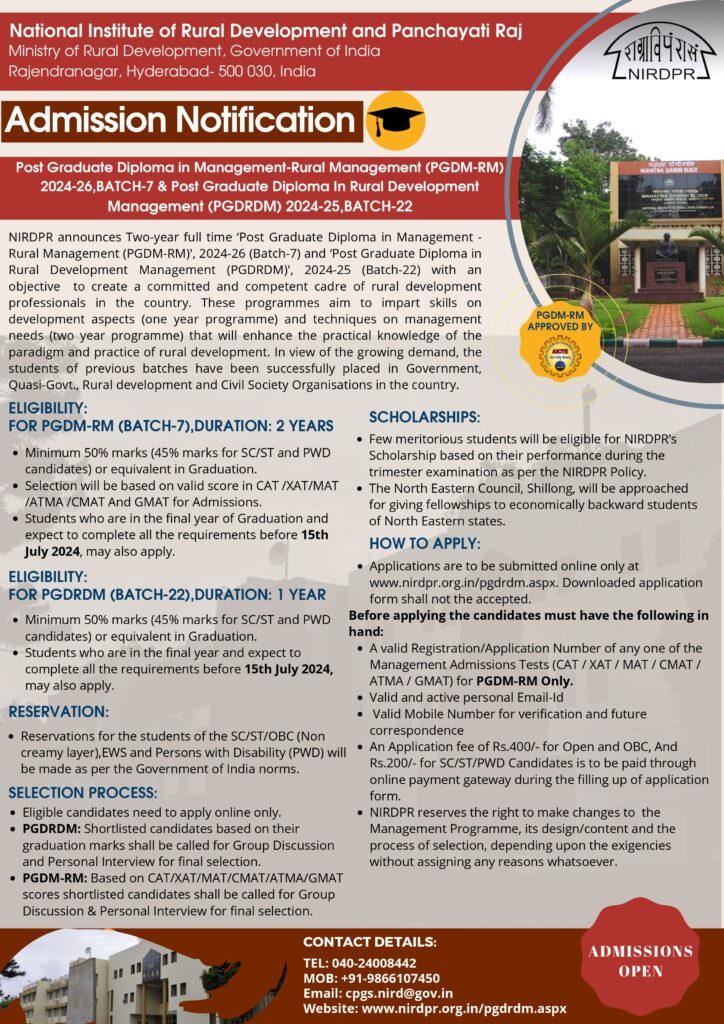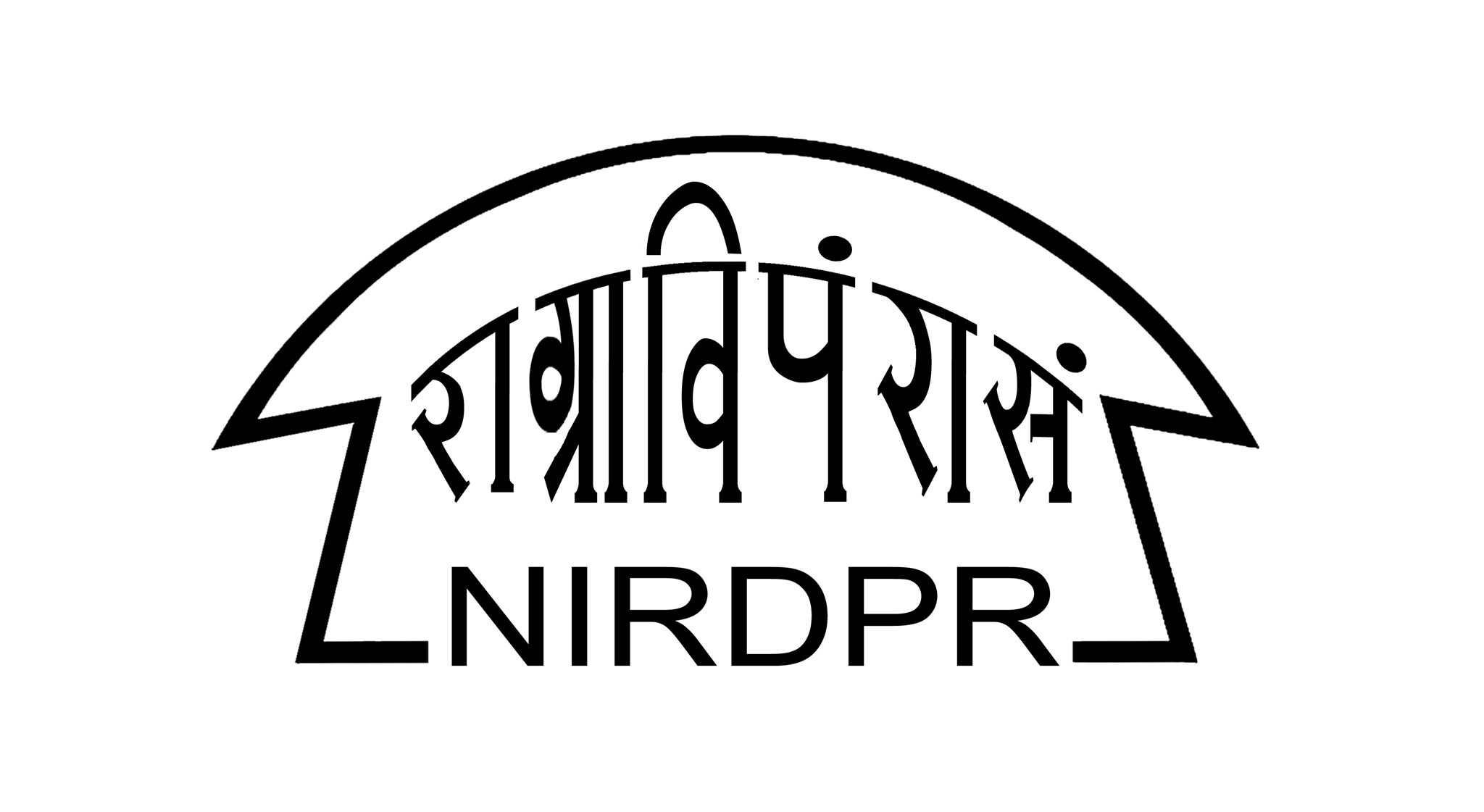
CONTENTS:
Training of MoRD Staff on Domain Competency under Annual Capacity Building Plan
Sectoral Training on Agriculture and Water Resources under NITI Aayog’s Aspirational Blocks Programme
Induction Level Orientation of Young Fellows on the Project for Creating Model GP Clusters
Training Programme on Research Methodology: Analysis, Interpretation and Dissemination of Data for RD and CSR Professionals
Training Programme on ICT for Data Analysis for Effective Planning and Management of RD Programme
CDC-Library Organises Book Fair 2024
Hindi Workshop & Inspection of Progressive Use of Official Language at NIRDPR-NERC
CDC Orgainses Library Talk on ‘India: Mother of Democracy’
Students of Yashwantrao Chavan School of Social Work Visits NIRDPR Delhi Branch
Training of MoRD Staff on Domain Competency under Annual Capacity Building Plan
The Ministry of Rural Development (MoRD), Government of India has been entrusted with the responsibility of accelerating the socio-economic development of rural India through various flagship programmes like Mahatma Gandhi National Rural Employment Guarantee Act (MGNREGA), Pradhan Mantri AwasYojana-Gramin (PMAY-G), Pradhan Mantri Gram Sadak Yojana (PMGSY), Deen Dayal Upadhyaya Grameen Kaushalya Yojana (DDU-GKY), Deendayal Antyodaya Yojana-National Rural Livelihoods Mission (DAY-NRLM), National Social Assistance Programme (NSAP), Saansad Adarsh Gram Yojana (SAGY), and Mission Antyodaya with budget allocation of Rs 1,57,545 crore.

It is imperative for the personnel stationed in the Ministry to receive regular orientation training to enhance the implementation of rural development programmes. These orientation training programmes primarily concentrate on the implementation of guidelines of the aforementioned flagship programmes, enabling officials and staff members to grasp the fundamental principles of these programmes and effectively contribute towards achieving the Ministry’s objectives.

MoRD, under the guidance of the Capacity Building Commission, has developed the Annual Capacity Building Plan (ACBP) based on the competency enhancement requirements of its officials that are ascertained through a Competency Need Analysis (CNA). The ACBP identified the most crucial competencies needed for different levels of functionaries within the Ministry, considering the role to be played by each designation in fulfilling the Ministry’s mandate as defined by the Allocation of Business Rules set by the Government of India.
Against this backdrop, NIRDPR has conducted four programmes for the financial year 2023-24 on MGNREGA, NRLM and PMAY-G. All the training programmes started with an inaugural address by Dr G. Narendra Kumar, IAS, Director General, NIRDPR giving the backdrop for the training and highlighting the importance of rural development policies, strategies and programmes followed by the sessions on various components of the flagship programmes. The training programmes also covered sessions on behavioural competencies like leadership, communication, etc. The training methodology included lecture-cum-discussion, group discussion, case presentations, exposure visits and exercises. In total, 82 MoRD staff were trained in four batches, starting from 13th February 2024 to 7th March 2024.
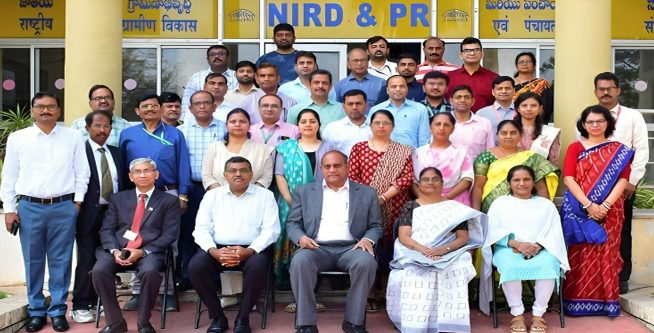
All four trainings were coordinated by the Centre for Wage Employment & Livelihoods (CWEL), NRLM and Centre for Research & Training Coordination & Networking (CRTCN) teams led by Dr C. Dheeraja, Associate Professor & Head, CWEL, Dr Ch Radhika Rani, Director, NRLM-RC and Dr C. Kathiresan, Associate Professor & Head, CRTCN.
Sectoral Training on Agriculture and Water Resources under NITI Aayog’s Aspirational Blocks Programme
The Aspirational Blocks Programme (ABP) is a critical initiative undertaken by the NITI Aayog to drive rapid development in 500 blocks under 325 districts across the country. The programme aims to achieve the saturation of essential government services in these blocks, covering multiple domains such as health, nutrition, education, agriculture, water resources, financial inclusion and basic infrastructure aiming at overall improvement in the quality of life of the rural people.

Leadership development training was organised for the Block Level Officials (BLOs) from the Aspirational Blocks of South Indian States, at the NIRDPR, Hyderabad during August and September 2023. Consequent to the Leadership Training, sector-specific experts were trained as Master Trainers at the NIRDPR, Hyderabad and sector-specific training programmes were organised from 21st to 29th February 2024.
Training of the BLOs and Aspirational Block Fellows (ABFs) of the Southern States, on Agriculture and Water Resources was conducted in two batches on 26th February 2024, and 28th February 2024. A total of 104 participants (85 BLOs and 19 ABFs) were trained in Agriculture and Water resources. Following is the break-up of the participants who received training:

In Agriculture and Water Resources, NITI Aayog has identified five Key Performance Indicators (KPIs) to be addressed in the blocks under the ABP programme. Tailored around the fundamental principles and objectives of the ABP initiative, the delivery was so designed to facilitate the successful learning of the participants (BLOs and ABFs). The participants were furnished with extensive knowledge, methodologies, and practical strategies that are crucial for the development of ABP blocks.
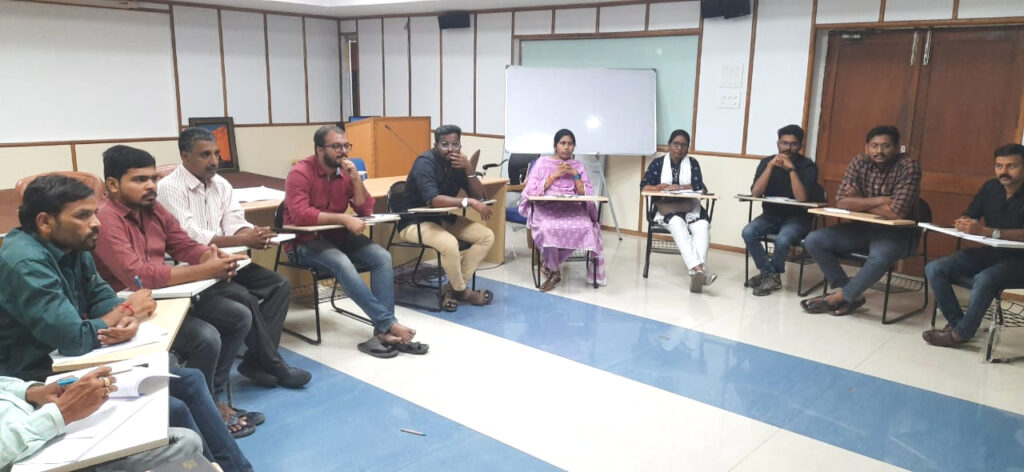
Following the principles of adult learning, it was ensured that the participants engaged in interactive learning. After orienting on the sector, the participants were made to discuss the challenges they faced in achieving the target and identify strategies to overcome those challenges by matching with suitable resources. A few of the sector-specific success stories and best practices were shared with the participants to make them analyse the reasons for the success of those cases.
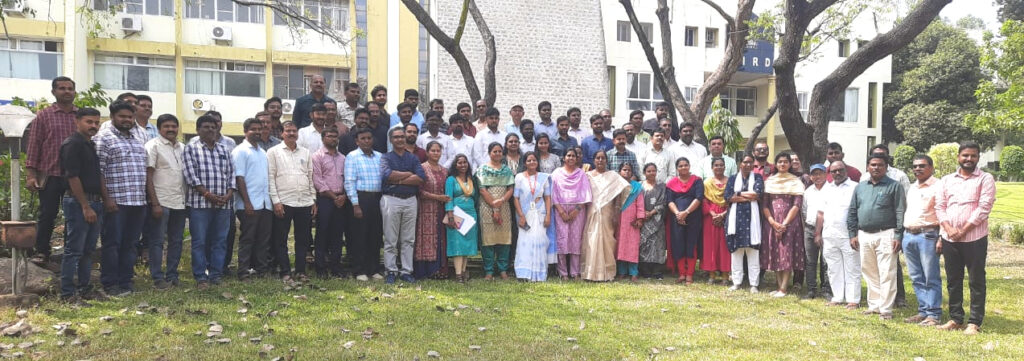
Agriculture being a specialised subject, some of the Aspirational Block Fellows who belonged to other specialisations, found it difficult to understand the theme its concepts and the indicators. As trainers, the faculty played the role of facilitators. These training sessions were organised by Assistant Professors, Dr Krishna Lohi Das and Dr V. G. Nitya, with the able support of Dr Jayasree and Mr Naresh of the Centre for Wage Employment and Livelihoods.
Induction Level Orientation of Young Fellows on the Project for Creating Model GP Clusters
The Centre for Panchayati Raj, Decentralised Planning, and Social Service Delivery (CPRDP&SSD), NIRDPR successfully concluded a ten-day Induction Level Orientation for newly engaged Young Fellows (YFs) of Project for Creating Model GP Clusters (PCMGPCs) – Batch 1 from 29th January to 8th February 2024.
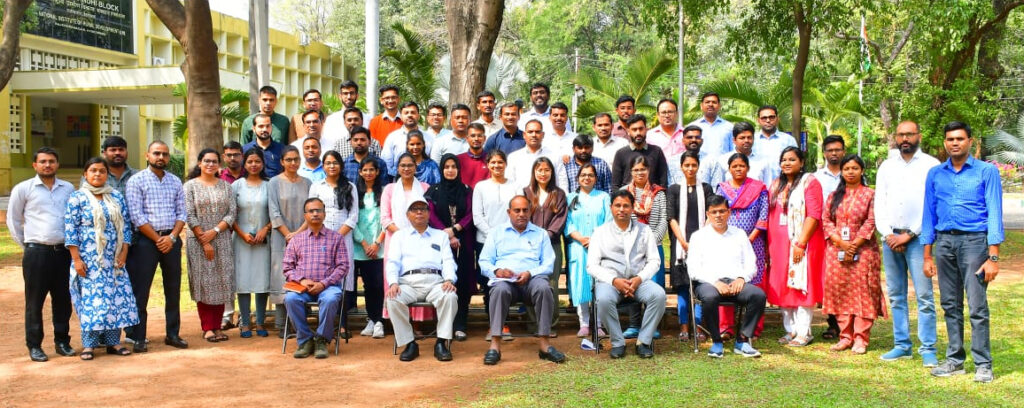
Dr G. Narendra Kumar, IAS, Director General of NIRDPR inaugurated the programme. In his keynote address, the DG congratulated the YFs and accentuated the significance of achieving the Sustainable Development Goals (SDGs) by 2030 through nine LSDGs. Shri Manoj Kumar, Registrar & Director (Administration) and Dr S. Raghu, Assistant Director, Administration (Section-I), also addressed the YFs. The primary objective of the PCMGPCs was to establish demonstrable models of Gram Panchayats (GPs) using a Cluster approach to accomplish comprehensive and sustainable development. This involves (a) strengthening the institutions of GPs, and (b) facilitating LSDG-focused Theme-based Quality GPDP by offering mentoring, motivation, additional technical guidance, and professional support through qualified and thoroughly trained YFs to encourage other GPs to emulate the Project GPs as models. On 25th January 2024, 170 candidates, who were selected through a competitive process, were engaged as YFs. A total of 45 participants posted in different clusters of 24 States attended the training programme. The remaining YFs will undergo training in February 2024 in one or two batches.
The sessions encompassed various facets of Panchayati Raj, including the functions of Gram Panchayats and principles of good governance. Extensive discussions were held on different flagship schemes and the nine LSDG themes. The participants were divided into nine groups, and they participated in a group exercise focusing on resource allocation, activity mapping, and the creation of sample GPDPs enabled by PDI for LSDG-based themes. On the last day, presentations were made on the actionable points within the Project GPs.
During the sessions, strategies for achieving project outcomes through high-impact actions were brainstormed and deliberated upon. Experts from CPRDP & SSD and NIRDPR faculty, senior consultants, and guest faculties shared their expertise as subject matter specialists and practitioners.
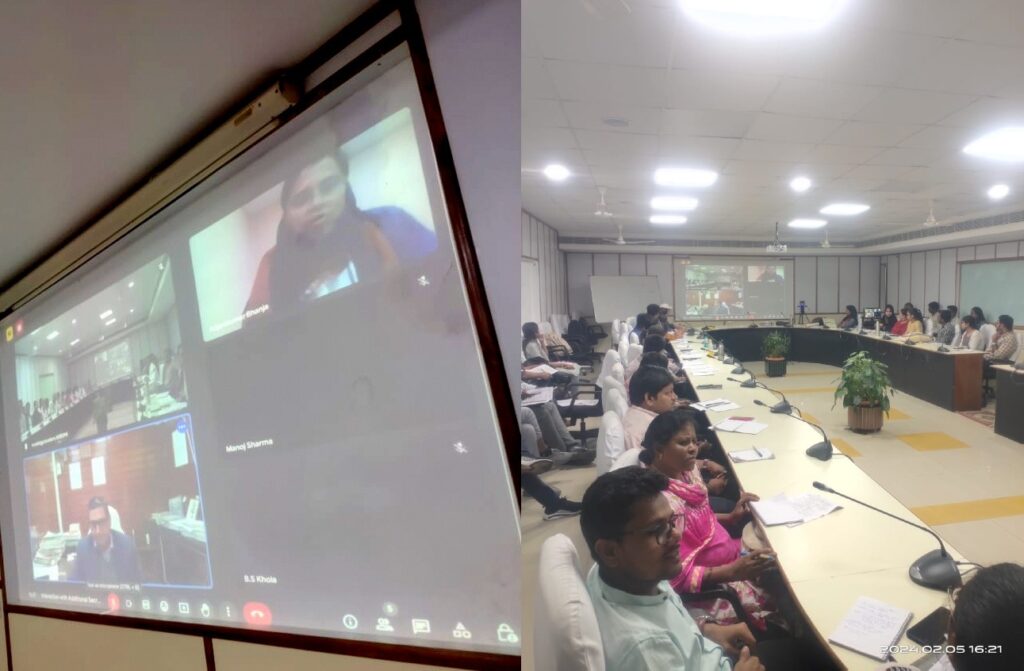
Officials from the Ministry of Panchayati Raj briefed about the e-Panchayati applications in an online session.
Dr Chandra Shekhar Kumar, IAS, Additional Secretary, Ministry of Panchayati Raj, delivered a special online address outlining the programmes of Ministry and the Roles of YFs.
Shri S. M. Vijayanand, IAS (Retd.) Former Director General of NIRDPR and ex-Secretary of MoPR, led sessions discussing the significance of Gram Panchayats in rural transformation, SDGs and GPDP, the roles of SHGs and other support institutions, including Academic Institutions and UBA, overcoming challenges to achieve project outcomes, the roles of YFs, and fostering an attitudinal shift towards a mission-oriented approach.
Dr M. Kalshetti, Deputy Director General of YASHADA and Director of SIRD, Maharashtra, conducted a session outlining the Aspirational Blocks Programme and the application of PDIs.
There was a one-day local field visit to Kadthal GP facilitated by Shri Guduru Laxmi Narsimha Reddy, Sarpanch, where they had an opportunity to interact with the Chairperson, Ward members and officials and to learn about various development activities being implemented by the PRIs. Agriculture is the primary source of revenue for the village. The GP has 4,000 acres of agricultural land and a well-established dairy farm system (Vijaya Dairy Farm). The GP has 271 operational Self-Help Groups engaged in various livelihood activities. As of 2023, the revenue generated in the GP is around Rs.50-60 lakh per annum of which a massive amount of taxes is backed by household taxes, i.e. Rs. 32 lakh and the rest from the Greenery fund, trade licence, weekly market and rented GP owned buildings. The participants were impressed by the cleanliness drive taken up by the GP. It provided two trash cans to every household free of cost, i.e., a blue dustbin for dry garbage and a degradable and green dustbin for disposing of recyclable waste. The GP also purchased a tractor for collecting trash. An innovative initiative of planting two saplings by newlyweds to receive their marriage certificate was introduced by the Sarpanch. Last year, 350 saplings were planted, and this adds to the greenery initiatives.

The induction-level orientation successfully equipped YFs with the necessary knowledge, skills, and attitudes to undertake their project roles effectively. It laid a solid foundation for their engagement in creating model GP clusters and fostering sustainable rural development. YFs comprehensively understood their roles and responsibilities within the project. Participants were prepared to work in mission mode with dedication and commitment towards project goals.
The training concluded with assessments and feedback sessions, ensuring participants’ understanding and providing a platform for continuous improvement. The YFs were poised to apply their learning effectively in their respective GP Clusters, contributing to the project’s success. The programme was evaluated on a five-point scale by the YFs, who rated it as excellent. The YFs expressed their utmost satisfaction with the facilities provided to them during their stay at the NIRDPR Campus.
Dr Anjan Kumar Bhanja, Associate Professor and Head of CPRDP&SSD, NIRDPR, was the Director of the Induction Level Orientation Programme.
The training sessions were highly informative, showcasing clear subject expertise, and the materials were presented engagingly and comprehensibly. The group activity centred on the LSDG theme-based GPDP, which was particularly beneficial, allowing us to grasp the concepts and integrate them into our tasks. The field visit to Kadthal GP was especially enlightening and valuable, offering innovative insights for collaborating with the gram panchayats.
–Ms. Nidhi Singh, Young Fellow (Telangana)
National Training Programme on Research Methodology: Analysis, Interpretation and Dissemination of Data for RD and CSR Professionals
The Delhi Branch of NIRDPR conducted a three-day national training programme on ‘Research Methodology: Analysis, Interpretation and Dissemination of Data for RD and CSR Professionals’ from 14th February 2024 to 16th February 2024 for the functionaries of NGOs, and social sector and government officials working with data and planning across 10 major states of India.

The programme started with an overview of the rural development programmes and the status of CSR in the aspect of Rural Development followed by an introductory test and discussion of the results. Post-inauguration, the technical sessions were initiated with Dr Ruchira Bhattacharya, Assistant Professor introducing research design to the participants besides its purpose and processing of statistical data with the help of practical exercise.
The research design session was followed by sessions on India’s Secondary Data Sources on Rural Development and Fundamentals of Sampling Primary Data by Mr Mohd Jerajuddin, Manager-Data Analyst, LeadsConnect Noida.

He focused on the fundamentals of sampling along with various sampling techniques and tools for field survey. With the help of various examples, he also described India’s secondary data sources on rural development.
On the second day, Dr Avishek Hazra, Director of Program and Policy Evaluation at Population Council Institute conducted hands-on sessions on ‘Fundamentals of Quantitative Analysis and Hands-on Exercise on Univariate Analysis.’ He described various types of data and the need for data analysis. He also focused on the techniques used for the univariate and bivariate analysis to interpret the data in the best way.

This was followed by sessions on multivariate analysis and hands-on exercises by Dr Ruchira Bhattacharya. On the third day, Dr. Rakesh Arya from Jawaharlal Nehru University introduced the participants to Spatial Analysis – Remote Sensing and GIS. He briefed about the basic understanding of GIS and remote sensing and current trends in GIS and its approaches to the field of rural development.

The final session of the programme discussed the entire landscape of rural development data and utilisation of these datasets in practical contexts by Dr Partha Pratim Sahu, Associate Professor, NIRDPR via virtual mode. The training programme concluded by summarising the learning of the participants by conducting an assessment and post-assessment discussion of the answers.
The programme was coordinated by Dr Ruchira Bhattacharya, Dr Ramesh Sakthivel and Dr Partha Pratim Sahu.
Training Programme on ICT for Data Analysis for Effective Planning and Management of RD Programmes
The Centre for Good Governance and Policy Analysis (CGGPA), NIRDPR organised a training programme on ‘ICT for Data Analysis for Effective Planning and Management of RD Programmes’ for senior and middle-level officials of Uttar Pradesh. The programme was organised at Deendayal Upadhyaya State Institute of Rural Development in Lucknow from 19th – 23rd February 2024.

A total of 37 officials and faculty working in various departments as well as regional and district level training institutes participated in this programme. Shri K Rajeshwar, Programme Director & Assistant Professor, NIRDPR welcomed the participants and briefed the objectives of the training programme.
In the inaugural session Shri B. D. Chaudhary, Additional Director, SIRD highlighted the significance of ICT interventions in rural development and emphasised the usage of data analysis for effective planning and management of rural development programmes.
The programme aimed to equip the participant’s knowledge and skills in rural development planning and management using MIS and ICT, and develop skills in analytical tools such as SPSS. Shri Alok Kushwah, Assistant Director interacted with the participants and highlighted the importance of ICT and MIS in rural development flagship programmes.
The training methods of the course were delivered through the participatory learning process. The sessions were dynamic and included introductory presentations, interactive sessions, lectures, documentary presentations, brainstorming and practical exercises, hands-on, etc.
The participants opined that program design, contents, programme deliveries and hospitality arrangements were impressive. A post-training evaluation was conducted and the participants submitted their feedback online. Shri K. Rajeshwar, Course Coordinator delivered the valedictory address.
The training programme was conducted by Shri K. Rajeshwar, Assistant Professor, Centre for Good Governance and Policy Analysis (CGGPA), NIRDPR with the assistance of Shri Alok Kushwah, Assistant Director, DDU-SIRD.
CDC-Library Organises Book Fair 2024
The Library section of the Centre for Development Documentation & Communication (CDC), NIRDPR, Hyderabad organised a two-day Book Fair 2024 from 28th – 29th February 2024.
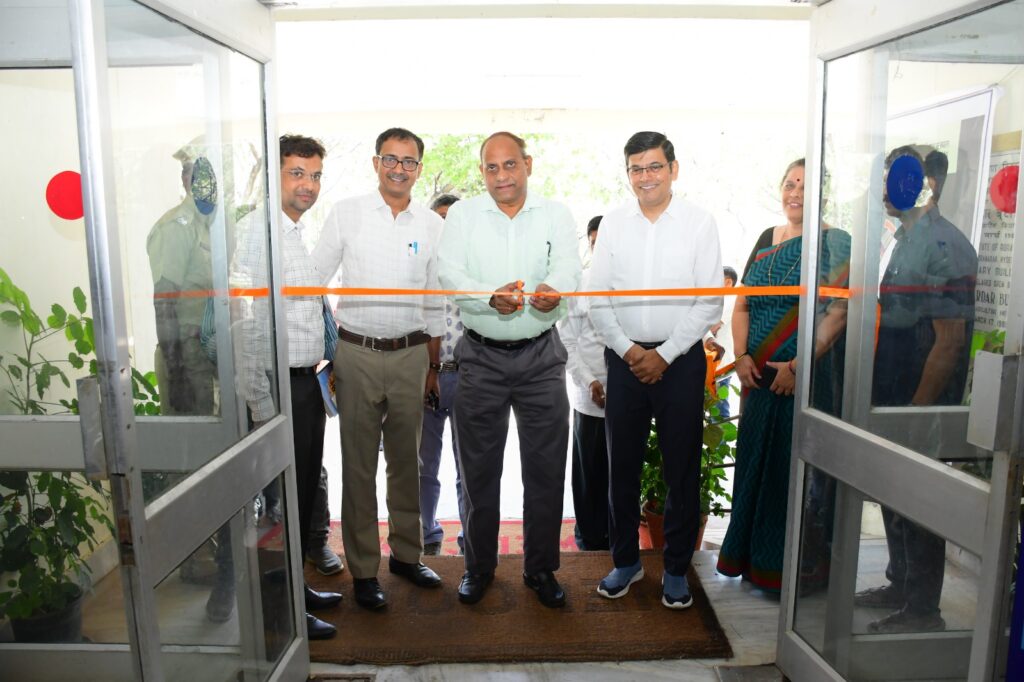
Assistant Director (OL)
Dr G. Narendra Kumar, IAS, Director General, NIRDPR inaugurated the event organised at the Dr B R Ambedkar Block on the Institute campus. Dr Jyothis Sathyapalan, Prof. & Head, CDC, Shri Manoj Kumar, Registrar & Director (Admin), and staff from various sections & centres of the Institute attended the inaugural ceremony.
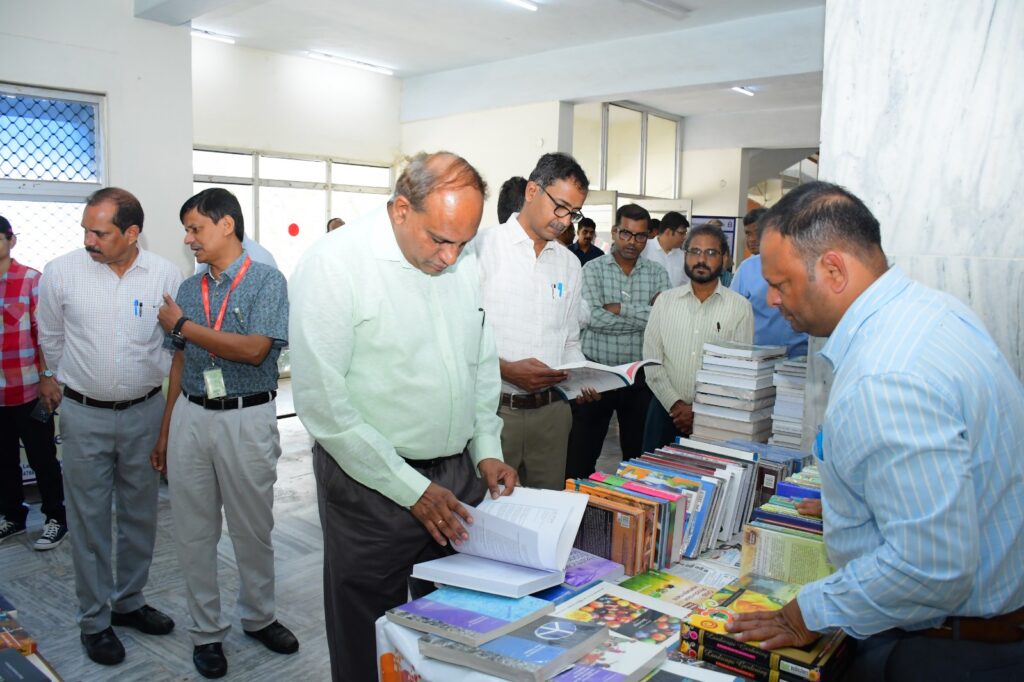
A total of 11 publishers and stockists, including Taylor & Francis, SAGE Publishing, WILFY, Orient BlackSwan, Cambridge University Press, Elsevier, etc., took part in the Book Fair. Nearly 5000 books were put on display for the perusal of faculty, non-academic staff and students.
Hindi Workshop & Inspection of Progressive Use of Official Language at NIRDPR-NERC
Keeping in view the need for employees of the Central government offices to perform their work in English as well as in Hindi, a Hindi workshop was organised at the National Institute of Rural Development and Panchayati Raj – North Eastern Regional Centre, Guwahati on 22nd February 2024.
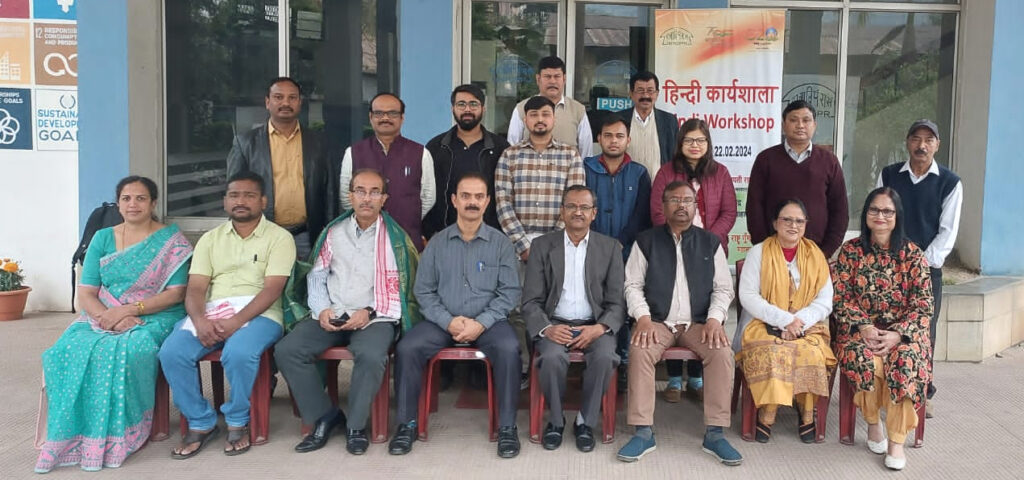
The theme of the workshop was ‘Use of Official Language Hindi in Daily Work.’ Shri Ramlal Sharma, Assistant Director, Official Language, Income Tax Building, Christian Basti, Guwahati was the Chief Guest and Speaker of the occasion.
In his lecture, Shri Ramlal Sharma explained the workshop’s objective besides providing information about the correspondence, comments and the goals of Section 3(3) set by the Department of Official Language. He also gave detailed information about Leela, the online translation tool and Unicode software in addition to practical information about noting and drafting.
Highlighting the benefits of Hindi workshop, Prof. R. Murugesan, Director of NIRDPR-NERC noted that the Institute has been making full efforts to achieve the goals of the Official Language Department. “We are getting guidance from the Headquarters, Ministry, and Regional Office, etc., from time to time. We perform office work in the official language using online translation tools. It is our responsibility to work in Hindi,” he added.
Speaking about the topic chosen for the workshop, Shri Arupjyoti Sharma, Administrative Officer, NIRDPR-NERC hoped that the workshop would benefit the employees by making them comfortable with working in Hindi. He also shared his experiences of working in Hindi.
Shri Arupjyoti Sharma also proposed vote of thanks. The programme was conducted by Shri Deepak Kumar, Junior Hindi Translator, NIRDPR-NERC. On this occasion, Smt V. Annapoorna and Shri Reddy Ramkrushna, Junior Hindi Translators at NIRDPR headquarters in Hyderabad were also present for inspection of the progressive use of official language at the NIRDPR-NERC and examination of the inspection questionnaire. Shri Arupjyoti Sharma, Administrative Officer and Shri Deepak Kumar, Junior Hindi Translator explained the functioning of the office and handed over the inspection report signed by the Director, NIRDPR-NERC.
CDC Orgainses Library Talk on ‘India: Mother of Democracy’
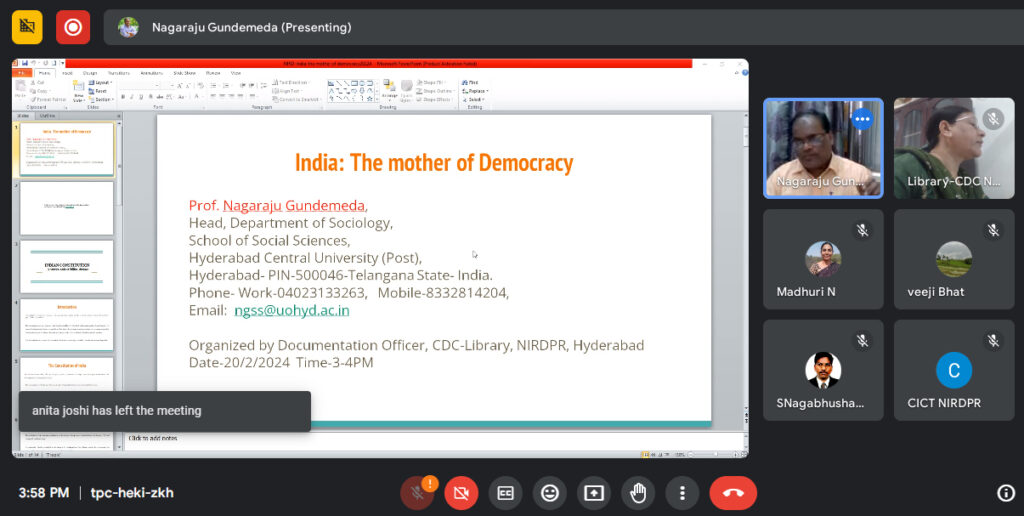
The Centre for Development Documentation & Communication (CDC), NIRDPR, Hyderabad organised a Library Talk on 20th February 2024 in virtual mode.
The Speaker of the occasion, Prof. Nagaraju Gundemeda, Head, Department of Sociology, Hyderabad Central University delivered a talk on the topic ‘India: Mother of Democracy,’ which was the theme of the 75th Republic Day of India.
“Democracy means not only the idea of political rights and electing political leadership. People with constitutional awareness need to understand that democracy also conveys the idea of economic distribution of resources, and addressing social problems. Therefore, political democracy is going to be meaningful only with reference to economic opportunities as well as social opportunities,” he said.
Further speaking about the idea of democracy, Prof. Nagaraju Gundemeda observed that the 200 years of colonial rule witnessed the institutionalisation of democracy in India in the context of Western countries. “On the one hand, the Western countries witnessed the making of democracy as an ideal mode of governance whereas the same democratic countries such as France, Netherlands, etc., waged war against many counties in Asia and Africa, which ended up in democracy for West and colonialism for the rest. In the context of India, this is how the colonial rule shaped the modern political systems,’ he added.
The faculty and non-academic staff of the Institute joined the event online.
Students of Yashwantrao Chavan School of Social Work Visits NIRDPR Delhi Branch
The NIRDPR Delhi Branch hosted an exposure visit for a group of students from the Yashwantrao Chavan School of Social Work, Urban and Rural Community Development, Satara, Maharashtra on 20th February 2024.

Dr. Ruchira Bhattacharya, Assistant Professor, NIRDPR-Delhi branch briefed the students about various programmes of NIRDPR. She also presented on the CSR and marketing work of the Delhi branch and introduced students to the areas of rural development which have a potential engagement with MSW in Urban and Rural Community Development. Shri Pramod Muneshwar, faculty of the institute, led the excursion.
Participants also took a short tour of the NIRDPR-IHC campus and expressed their gratitude for the information they gained about the Institute.
